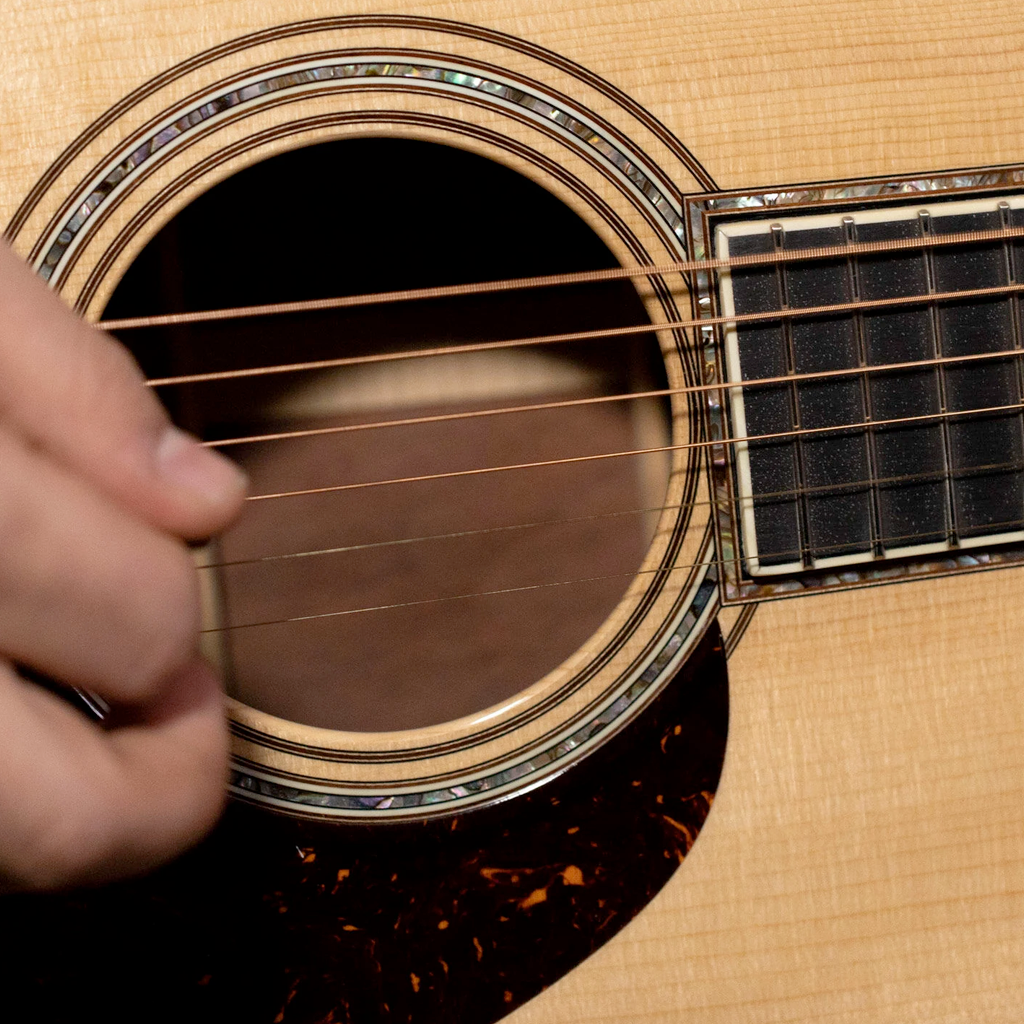Tips & Tutorials | February 22, 2023
Why Guitar Strings Are Important

Guitar strings may be an afterthought for some musicians, but the truth is that guitar strings are fundamental to the enjoyment of your guitar. When you play your guitar, you interact with your strings using both hands. You feel your fingers sliding over them as you play your next note or chord, and you hear their sound ring true.
By understanding the true importance of guitar strings, you can make the right string decisions for yourself along your musical journey. You'll also better understand your guitar, which can help you become a better musician with every practice session or gig.
Why Are Guitar Strings Important?
Guitar strings are perhaps the most crucial part of any functioning guitar. Without strings, a guitar would simply be a display of woodworking artistry. It could have all the other necessary parts that make a guitar what it is — like the tuning pegs, the soundhole, and the fretboard — but the strings unlock the full potential of your guitar.
When you play your guitar, you interact with the strings more than any other component. You feel the texture of the strings as you play. And with every strum, you send vibrations into your guitar. Your guitar body adds rich harmonics to these vibrations and amplifies the sound. This is what hits your ears when you play your guitar. This is the music you create.
Many types of guitar strings exist to suit any type of playing style or guitar specifications. By pairing the right guitar strings with your guitar, you can get the tone, tension, and feel needed to achieve your desired results within your genre or playstyle.

How Do Guitar Strings Affect Sound and Tone?
Strings are made of different materials and winding types that affect your guitar's tone, sound and volume. Whether you want shimmering highs and rich lows or a more pronounced midrange with tamed bass, you can achieve your desired sound by choosing a string material that provides those tones. For instance, Monel (Nickel-Copper Alloy) strings will have a warm tone with a more dominant low end compared to 80/20 bronze strings, which have a brighter tone with crisper highs.
You have several types of windings to consider, including roundwound, flatwound, and halfwound. The windings describe the wrapping around the string’s core wire. The wrapping method influences the tone that the strings produce, with roundwounds having a brighter, edgier sound and flatwounds having a smoother, mellower sound. Each winding type also provides a different texture that can coincide with your playing style, whether you want your strings to be smooth and sleek or have a bit more grip and resistance.
Why Do Guitar Strings Break?
Guitar strings break. It's a fact of life for guitarists. Here are some of the main reasons why it happens:
- Old strings: Strings deteriorate from oils, rust, and constant playing as they age. The older your strings are, the more susceptible to breakage they are.
- Wrong tension: Guitar strings come in various gauges — or sizes — that affect the amount of tension the strings exert on the neck. Every guitar is built to handle a certain gauge. Use the wrong string gauge on your guitar, and you put yourself at risk of breaking a string.
- Rough fret edges: If your frets have rough edges, they can cut into your strings as you press down on them. Over time, this can cause them to break.
- Sharp Saddles and Nuts: Sometimes burrs can form on the saddle or nut that can snag and wear strings prematurely.
- Alternate tunings: It's fun to experiment with different tunings. But if your string gauges are incorrect for the type of tuning you're trying to play, you could accidentally end up breaking some of your strings.
- Playing style: Harder playing styles, especially those using picks, can cause you to break your guitar strings more often.
Why Do Guitar Strings Need To Be Changed?
You must change your strings if you want to get the most out of your guitar. Here are some of the scenarios when it would be a good idea to change your guitar strings:
- Loss of tone: As strings age, they lose some of their sound quality. Changing your strings can help you restore your guitar's full tone and overcome a dull sound.
- Tuning issues: Old strings can have tuning issues, like falling out of tune often or losing intonation as they age. If this is happening to you, then it might be time to change your strings.
- Rust and grime: The more you play your guitar, the grimier your strings will become. Even a guitar that rests on a stand all day long will collect dust, and the moisture in the air can cause corrosion and rust. When strings get like this, you should replace them.
- Strings are unwinding: If the winding of your strings is starting to come undone, that's a sure sign that you need new guitar strings.
- Kinks: Visible kinks in your guitar strings signify that your strings are near the end of their usable life span.
How Often Should I Change Guitar Strings?
The answer to this question is different for every guitarist. Gigging musicians often change their strings before every show to ensure they get the best sound possible. Musicians who practice guitar for several hours a day may want to change their strings every week or two. Casual musicians may only have to change their strings every few months.
Even an unused guitar should have its strings changed every few months, as unused strings can still deteriorate as they age. Think about your playing style and how often you play your guitar. And remember that a new set of strings is always an improvement for your guitar, as long as they're the right gauge and material for your needs.

Do More Expensive Strings Make a Difference?
Premium guitar strings can offer unique and proprietary materials that will often yield the best results for guitarists. Manufacturers can make strings more affordable by using low-quality materials and manufacturing practices, and while these types of strings are great for guitarists on a budget, they may be less enjoyable to play and hear than more premium guitar strings.
When you buy premium strings, you are investing in your journey as a musician. You are willing to pay for better quality materials and a more trustworthy manufacturing process. This can give you peace of mind that your strings will sound great and be durable and long-lasting. Plus, higher-quality strings can offer better tuning stability and dynamics, which are both essential in the results you get every time you play your guitar.
Choose Martin Guitar Strings
At C.F. Martin & Co., we manufacture our own strings to ensure the best quality and the full experience with your Martin guitars. But Martin strings will also help you reach your full musical potential, whatever brand of acoustic guitar you use. Shop acoustic guitar strings online today to find the right set for you.